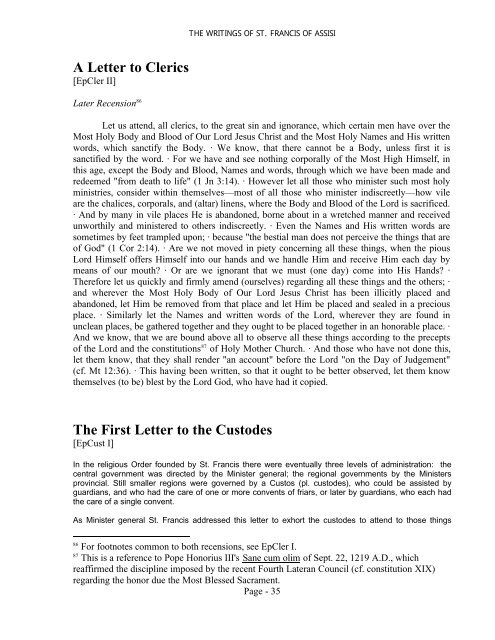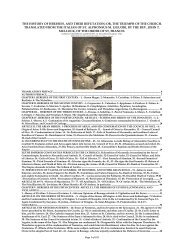The Writings of St. Francis of Assisi - + Saints' Works
The Writings of St. Francis of Assisi - + Saints' Works
The Writings of St. Francis of Assisi - + Saints' Works
You also want an ePaper? Increase the reach of your titles
YUMPU automatically turns print PDFs into web optimized ePapers that Google loves.
A Letter to Clerics<br />
[EpCler II]<br />
Later Recension 86<br />
THE WRITINGS OF ST. FRANCIS OF ASSISI<br />
Let us attend, all clerics, to the great sin and ignorance, which certain men have over the<br />
Most Holy Body and Blood <strong>of</strong> Our Lord Jesus Christ and the Most Holy Names and His written<br />
words, which sanctify the Body. · We know, that there cannot be a Body, unless first it is<br />
sanctified by the word. · For we have and see nothing corporally <strong>of</strong> the Most High Himself, in<br />
this age, except the Body and Blood, Names and words, through which we have been made and<br />
redeemed "from death to life" (1 Jn 3:14). · However let all those who minister such most holy<br />
ministries, consider within themselves—most <strong>of</strong> all those who minister indiscreetly—how vile<br />
are the chalices, corporals, and (altar) linens, where the Body and Blood <strong>of</strong> the Lord is sacrificed.<br />
· And by many in vile places He is abandoned, borne about in a wretched manner and received<br />
unworthily and ministered to others indiscreetly. · Even the Names and His written words are<br />
sometimes by feet trampled upon; · because "the bestial man does not perceive the things that are<br />
<strong>of</strong> God" (1 Cor 2:14). · Are we not moved in piety concerning all these things, when the pious<br />
Lord Himself <strong>of</strong>fers Himself into our hands and we handle Him and receive Him each day by<br />
means <strong>of</strong> our mouth? · Or are we ignorant that we must (one day) come into His Hands? ·<br />
<strong>The</strong>refore let us quickly and firmly amend (ourselves) regarding all these things and the others; ·<br />
and wherever the Most Holy Body <strong>of</strong> Our Lord Jesus Christ has been illicitly placed and<br />
abandoned, let Him be removed from that place and let Him be placed and sealed in a precious<br />
place. · Similarly let the Names and written words <strong>of</strong> the Lord, wherever they are found in<br />
unclean places, be gathered together and they ought to be placed together in an honorable place. ·<br />
And we know, that we are bound above all to observe all these things according to the precepts<br />
<strong>of</strong> the Lord and the constitutions 87 <strong>of</strong> Holy Mother Church. · And those who have not done this,<br />
let them know, that they shall render "an account" before the Lord "on the Day <strong>of</strong> Judgement"<br />
(cf. Mt 12:36). · This having been written, so that it ought to be better observed, let them know<br />
themselves (to be) blest by the Lord God, who have had it copied.<br />
<strong>The</strong> First Letter to the Custodes<br />
[EpCust I]<br />
In the religious Order founded by <strong>St</strong>. <strong>Francis</strong> there were eventually three levels <strong>of</strong> administration: the<br />
central government was directed by the Minister general; the regional governments by the Ministers<br />
provincial. <strong>St</strong>ill smaller regions were governed by a Custos (pl. custodes), who could be assisted by<br />
guardians, and who had the care <strong>of</strong> one or more convents <strong>of</strong> friars, or later by guardians, who each had<br />
the care <strong>of</strong> a single convent.<br />
As Minister general <strong>St</strong>. <strong>Francis</strong> addressed this letter to exhort the custodes to attend to those things<br />
86 For footnotes common to both recensions, see EpCler I.<br />
87 This is a reference to Pope Honorius III's Sane cum olim <strong>of</strong> Sept. 22, 1219 A.D., which<br />
reaffirmed the discipline imposed by the recent Fourth Lateran Council (cf. constitution XIX)<br />
regarding the honor due the Most Blessed Sacrament.<br />
Page - 35













